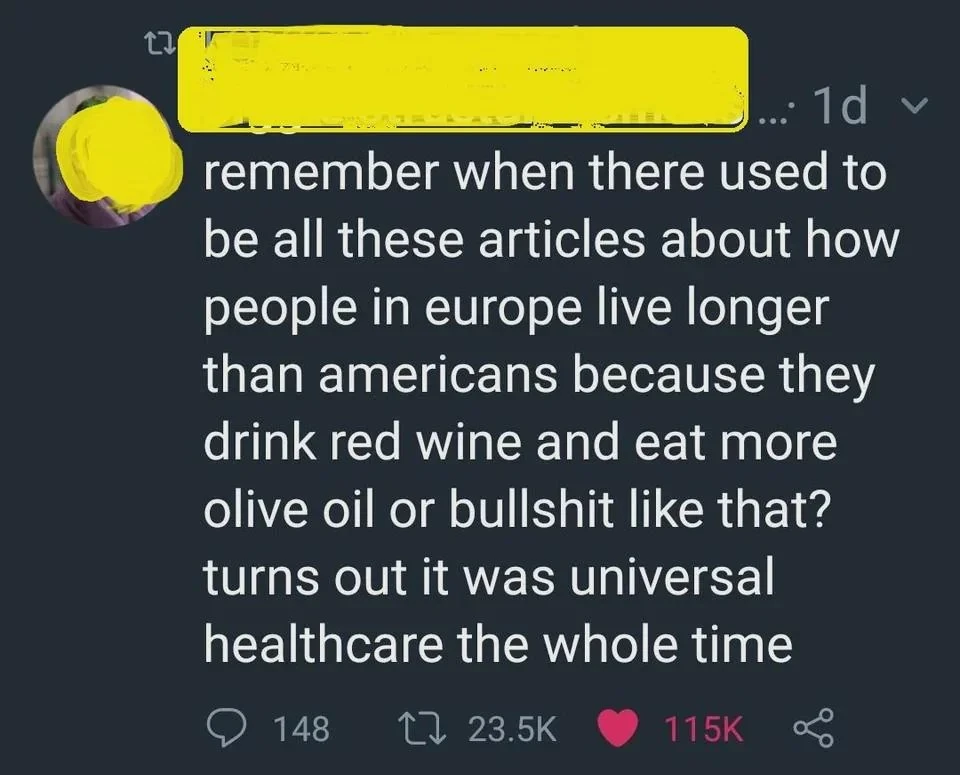Does this mean I can stop stuffing my face with olives now
Does this mean I can stop stuffing my face with olives now


Does this mean I can stop stuffing my face with olives now


You're viewing a single thread.
Universal healthcare might help but it is also--
Don't forget the wage slave mentality: forced long hours, extreme stress in a fast pace work environment, the non-existent vacation days, and at-will employment
Point 3 is just wrong.
Japanese don't have easy access to guns and yet Japan has one of the highest suicide rates.
Same with Uruguay, highest suicide rate in America without having easy access to guns.
The suicide rate obviously has multiple contributing factors, but access to firearms is absolutely one of them. There's multiple studies on this that will come up in a quick web search. In general, access to anything that makes suicide more impulsive increases the suicide rate. I say this as a person who absolutely believes that access to firearms should be the default state for those that want it.
This is a myth. The suicide rate in Japan is lower than the US, and similar to European countries. South Africa, Russia, and Korea have bonkers suicide rates.
Opportunity and desire both contribute to rate. Firearms increase opportunity so more of those with desire will try. Some cultures also give more people the desire so more attempts will be made using other methods. It is not either or.
Apples and oranges. Japan has an insane work culture that leads to burnout and depression, and therefore more suicides. Not sure why Uruguay has such a high suicide rate, but they also have a completely different culture than both America and Japan. The method in which you take your life is less important if you are intent on taking your own life. Guns make it super easy.
Access to firearms increases the rate of suicide. He may have worded it poorly but the point stands. The fact that other countries have worse rates of suicide without firearms notwithstanding, because if they had access to firearms, it would be even higher.
Is alcohol abuse more prevalent in the US?
The US alcohol consumption avg. is 2.51 gallons, or 9.5 litres per person and year. In the EU the average is also 9.5 litres per person and year. For drug abuse i know the US have the specific opiod problem, but that also seems to be a result of a poor healthcare system, where taking painkillers until addiction is chosen over actually solving the underlying injuries for monetary reasons.
For the alcohol question, I'm actually very interested in seeing a stat of solitary drinking vs social drinking, and how it affects these statistics.
For instance I know parts of Europe still hold a very strong comraderie "pub culture." Alcohol is involved but so are strong social bonds.
The U.S has lately been making lots of quips about "wine moms" driven to sneak cheap chardonnay from the top cabinet, as well as the cliché portrayal of "working man who is so chewed up and burned out he needs a whisky and TV to sleep."
Not a fan of heavy drinking in general, but I hypothesize alcohol paired with isolation is much more likely to result in abuse and depression.
Plus less stress due to a culture that values family and recreation time.
As pointed out, guns are a means to suicide, not the cause. While I do believe in gun control, until we have physician assisted suicide, guns are some of the most reliable ways for people to have a say in when their life ends.
Take away the guns(the this specific circumstance, not talking about other gun related issues) and the suicide rate will maybe go down, but the rate of unsuccessful, excruciating, and possibly disfiguring/disabling suicide attempts will absolutely go up.
Absolutely. Sorry for the long post because I struggle to pare it all down but:
The suicide rate AND the homicide rate is because we live in an inhuman society that, underneath all the transparent PR, is practically egging you on to "just do it already."
Ultimately.... Guns don't go off by themselves. We could have 10x as many guns in this country, hand em' out for free even, and, barring negligence and stupidity, suicides and homicides would still drop dramatically if people weren't constantly DARED to use them every second of their existence. On themselves, on "others."
Our media also glorifies weaponry as some kind of ultimate problem-solver. So much power to change something, ANYTHING, at the pull of a trigger. And so many people are so desperate to just affect something.
If they had access to education, care, mental wellness, actually felt like they mattered, and weren't obviously seen to just be batteries and cattle by the ones designing and "influencing" this culture. Those guns wouldn't go off nearly so often.
When we have teenagers and young adults contemplating their own deaths because a contented existence seems so out of touch and the struggle for better so hopeless, what happened??
But the conversation seems to be less "How do we make a world where people DON'T wish to kill themselves or others so often?" And more "How do we stop them from doing it?"
Which, at its most idealistic extreme, will simply produce a hell-world of limbless, miserable torso-brains with no way out of misery.
Every day we carry on and try to love our neighbors, and make anything just a bit better, and forgive our enemies, and be content with what things we own, is a radical act of defiance against the principalities and powers that feed on the cultivation of our very worst selves.
Well yeah, the solution for how to not make people want to kill themselves is obvious. But it runs contrary to the goals of those in charge.
Whereas stopping consumers from killing themselves, that's a big problem.
Don't underrate the amount of walking Europeans do compared to Americans. That casual exercise makes a huge difference. Europe is much more urban than the US and they generally walk a lot more than we do.
Not saying it's enough to be in the best shape of your life but it's really good for you.
About point 4, there is this really weird phenomenon that people going one way or the other replicate the same results without consciously changing the way you eat. Americans eating "unhealthy" in Europe get better and Europeans "eating healthy" in the US get worse.